Ever thought that the mess around you mirrors the turmoil inside? Organizing is more than just tidying up; it’s a form of self-care. This article will show how organizing can change your space and improve your mental health. By decluttering, you’re not just cleaning up. You’re also boosting your peace of mind and embracing clarity. Let’s explore how these simple steps can nurture your emotional health!
Key Takeaways
- Organizing serves as a powerful tool for mental health benefits.
- Decluttering your environment creates a sense of calm and clarity.
- Embracing self-care through organizing can improve emotional wellness.
- Establishing sustainable habits supports ongoing self-care efforts.
- Practical tips can guide you on your journey of decluttering.
Understanding Organizing as Self-Care
Organizing goes beyond making spaces look good; it’s vital for our emotional health. A clean environment boosts our mental clarity. It reduces stress and keeps us focused, making daily life more fulfilling.
Decluttering boosts productivity and gives us a sense of achievement. As we organize spaces that reflect our values, we improve our well-being. Organizing is a form of self-care, allowing us to find joy and creativity in our surroundings.
Don’t see organizing as just another task. It’s a way to empower yourself and care for your emotional health. Seeing it as a self-care practice enriches both your mind and spirit.
Recognizing Clutter’s Impact on Mental Health
Clutter can significantly affect mental health, yet many overlook its impact. The visual distractions from disorganization lead to increased anxiety and feelings of overwhelm. Studies show that clutter causes stress, contributing to a chaotic mindset. Recognizing these effects motivates individuals to declutter their surroundings.
Every item in a cluttered area symbolizes an unmade decision, weighing heavily on the mind. This emotional burden can cause feelings of helplessness, making it hard to focus on daily tasks. Acknowledging the connection between clutter and anxiety reduction empowers individuals to create a more serene environment. By decluttering, we regain control over our spaces and enhance our emotional well-being.
Creating a cleaner, organized space is key to effective stress management. Letting go of unnecessary items fosters calm and clarity. Embracing minimalism simplifies our surroundings and promotes a peaceful mind. Strategies to reduce clutter offer tangible mental health benefits. Explore minimalist design and its positive effects on mental well-being here.

Benefits of Decluttering for Self-Care
Decluttering offers more than just a tidy space; it’s a journey to self-care. It enhances emotional well-being by clearing the mind and heart. A clean environment boosts motivation, helping you to clear your space and your thoughts.
Decluttering is not just about cleaning; it’s about starting anew. It frees up emotional space, allowing you to focus on what’s important. A clean environment brings a sense of achievement and reduces stress and anxiety. Studies show that minimalism improves mood and lowers stress levels.
Your environment mirrors your mental state, making decluttering a powerful tool for mental health. As you organize, you see how your surroundings affect your emotions. This connection supports emotional well-being and aligns with minimalism, guiding you to make choices that reflect your values.
Steps to Begin Your Decluttering Journey
Embarking on a decluttering journey can seem daunting, but breaking it down into manageable steps simplifies the task. Begin with one area, like a room or a specific item category. This approach allows you to focus your efforts and reduces stress. Allocate short, dedicated time slots each day, such as 20 minutes, to make steady progress without exhaustion.
Every small achievement boosts your confidence and motivates you to continue. This journey transcends mere tidying; it’s a vital aspect of self-care. Keep your organizing tips at hand to guide you through the process. Divide tasks into smaller, more manageable parts, and aim to enjoy the journey. Remember, you’re not just clearing space; you’re also cultivating your well-being.
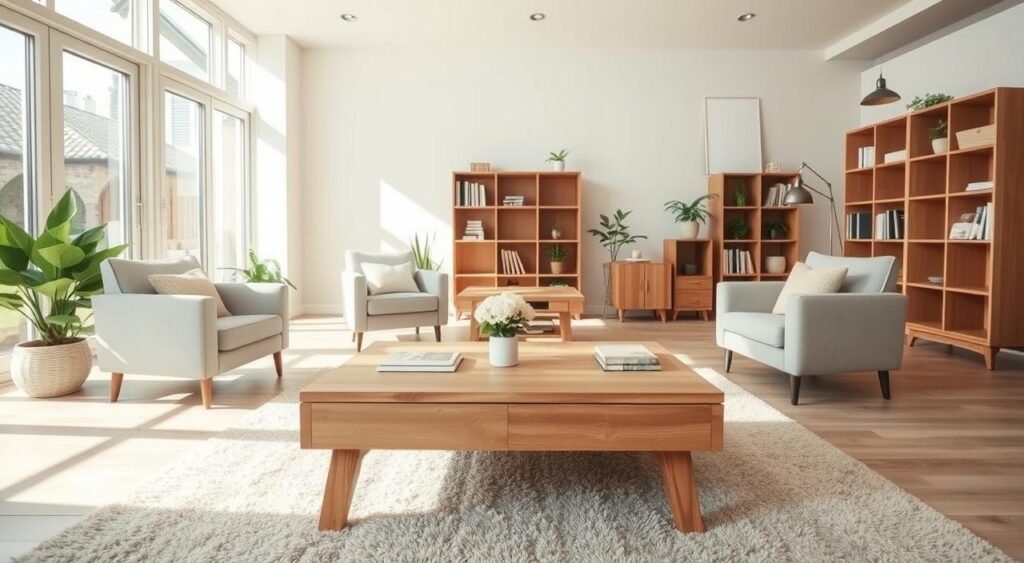
| Step | Action | Benefit |
|---|---|---|
| 1 | Choose a specific area | Focuses your effort |
| 2 | Set a timer for 15-30 minutes | Prevents burnout |
| 3 | Sort items into categories | Makes decision-making easier |
| 4 | Celebrate small wins | Boosts motivation |
By taking these steps, you not only organize your space but also enhance your mental health. Embrace the journey and revel in the transformative effects of decluttering!
Setting Intentions for Organizing
Before starting to organize, it’s essential to set clear intentions. Reflect on your core values to guide your decisions on what to keep or discard. Questions about simplicity and sustainability can simplify your choices.
Write down your goals to clarify your values. This step turns organizing into a meaningful self-care practice. Creating a vision board or mood board can serve as a constant reminder of your goals. It keeps you inspired and focused on your journey.
Let your values lead your organizing efforts. This approach motivates you to create a space that reflects your beliefs. It not only improves your environment but also boosts your overall well-being.
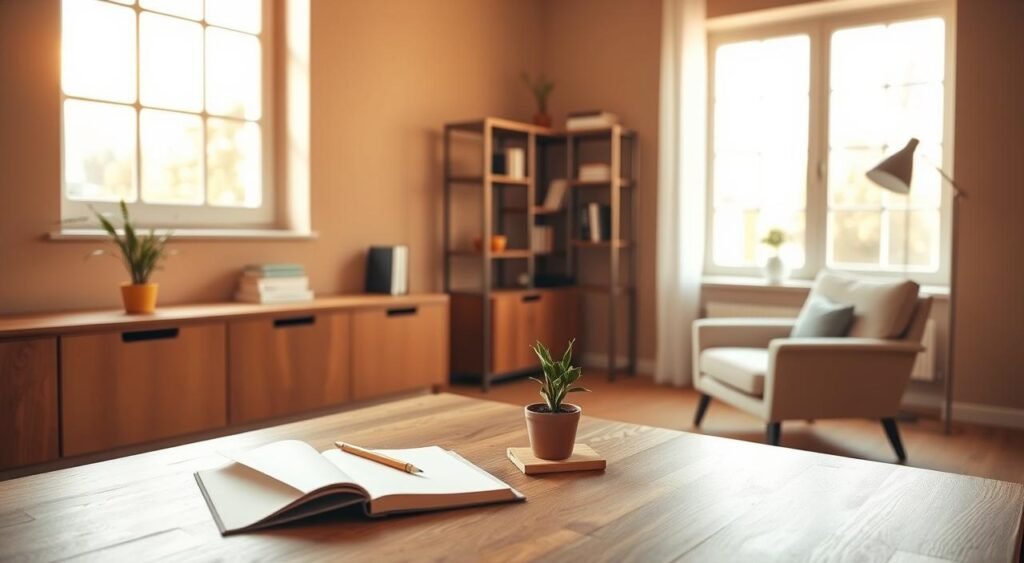
Creating a Decluttering Plan
Developing a detailed decluttering plan is key to reaching your organizing objectives. Begin by identifying specific areas or categories to tackle, like the kitchen, closet, or garage. Setting a timeline helps keep you on track, so plan out dedicated sessions for each space. This structured approach makes the task less daunting.
Having the right tools and supplies, such as bins, bags, or labels, is vital. They aid in sorting items quickly, enabling you to decide what to keep, donate, or throw away. By following these steps, you can reduce feelings of overwhelm and stay focused on your decluttering path.
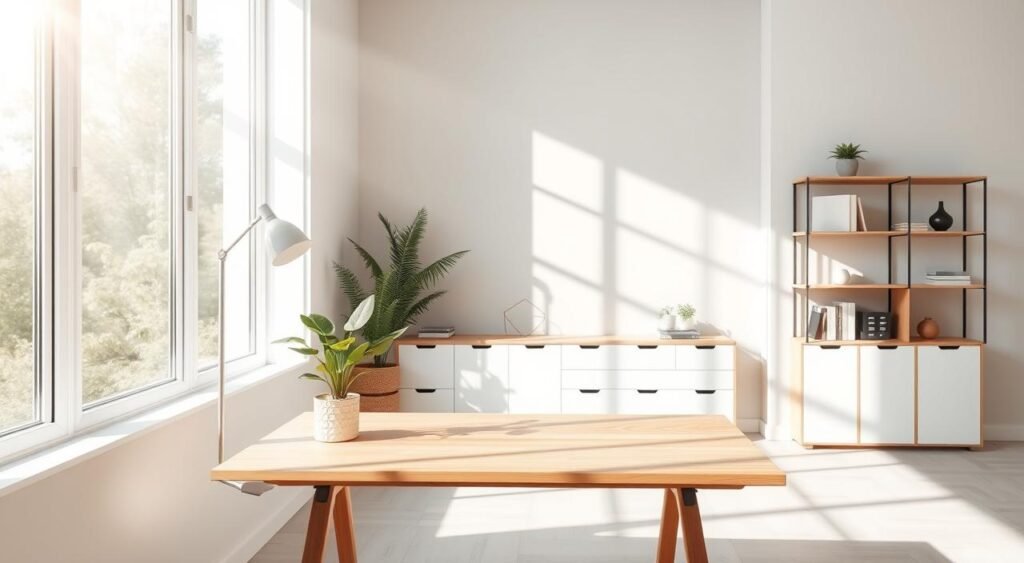
Organizing as Self-Care: The Five Steps
Starting a journey of self-discovery through organizing not only helps declutter but also enriches life. Understanding these steps is vital for effective self-care. Let’s dive into each step to help you create your perfect space.
Step 1: Connect
Your first task is to connect with your core values. What does organizing mean to you? Anchoring to these values provides a strong foundation for your decluttering process. Understanding why you want to declutter keeps you motivated and focused.
Step 2: Create
Imagining a clutter-free life is essential. Visualize not just your space, but the positive outcomes that will follow this shift. What opportunities will emerge? What mental clarity will you gain? This step incorporates creativity into your process, bridging the gap between dreams and reality.
Step 3: Release
Letting go of items that no longer serve you is a powerful act. Releasing possessions frees up not only physical space but also emotional baggage. Consider what aligns with your goals and values—this clarity makes room for new possibilities in your life.
Step 4: Recalibrate
Now it’s time to reorganize what remains. Zoning your space enhances functionality and comfort. Arrange your items in a way that suits your everyday needs. This recalibration maintains a sense of order and reinforces your commitment to ongoing organization.
Step 5: Rhythm
Establishing a rhythm is about building habits that promote sustainability. Regularly check in on your organized spaces. Quick tidying routines and intentional maintenance ensure your environment remains in harmony with your self-care strategies.
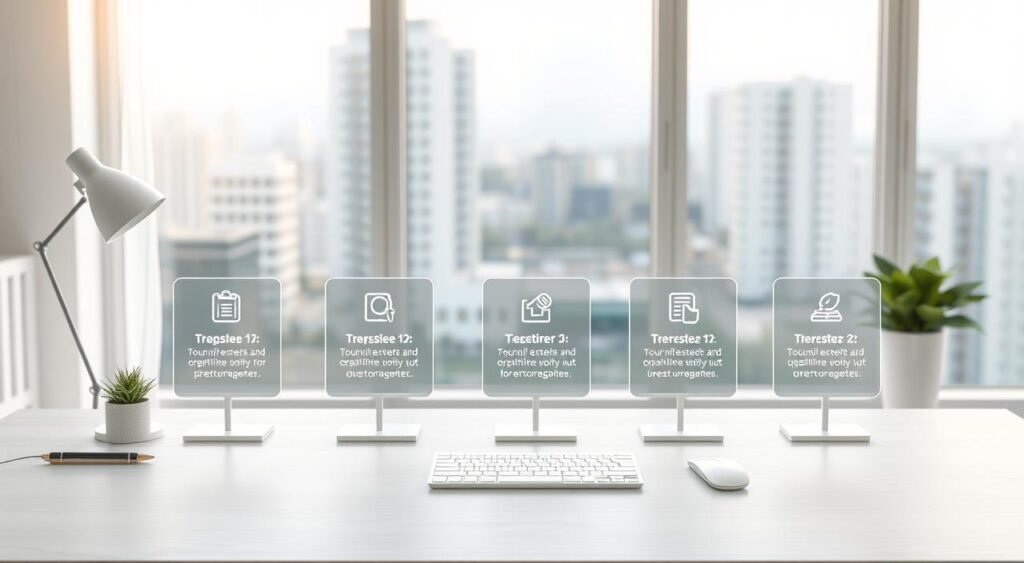
Connecting with Your Values and Intentions
To declutter effectively, it’s essential to connect values with your organizing intentions. This alignment creates a solid foundation for your journey towards a more intentional living space. Start by evaluating your belongings and ask yourself: do these items genuinely serve a purpose? Do they bring joy or simply fill space? This reflective process promotes emotional growth, giving you clarity on what to keep and what to let go of.
Understanding the emotional significance of your possessions plays a critical role in this endeavor. When you recognize how your items align with your true self, it becomes easier to part with those that no longer resonate with your path. This mindfulness not only improves your living environment but also enriches your emotional well-being.

Mindfulness in the Decluttering Process
Integrating mindfulness into your decluttering journey can profoundly change how you interact with your belongings. By focusing on the present, you gain a deeper appreciation for each item’s role in your life. This shift in perspective enables you to adopt a decluttering mindset that values emotional clarity above all else.
Utilizing focused breathing while sorting items can be incredibly effective. It grounds you, reducing the stress that often accompanies decision-making. Ask yourself, “Does this item serve a purpose in my present life?” or “How does this item make me feel?” Each question helps you connect more deeply with what you choose to keep or discard.
This mindful approach encourages self-compassion, allowing you to respect your feelings about letting go of items that no longer benefit you. Mindful decluttering transcends mere tidiness. It’s about creating a serene space that mirrors your authentic self.
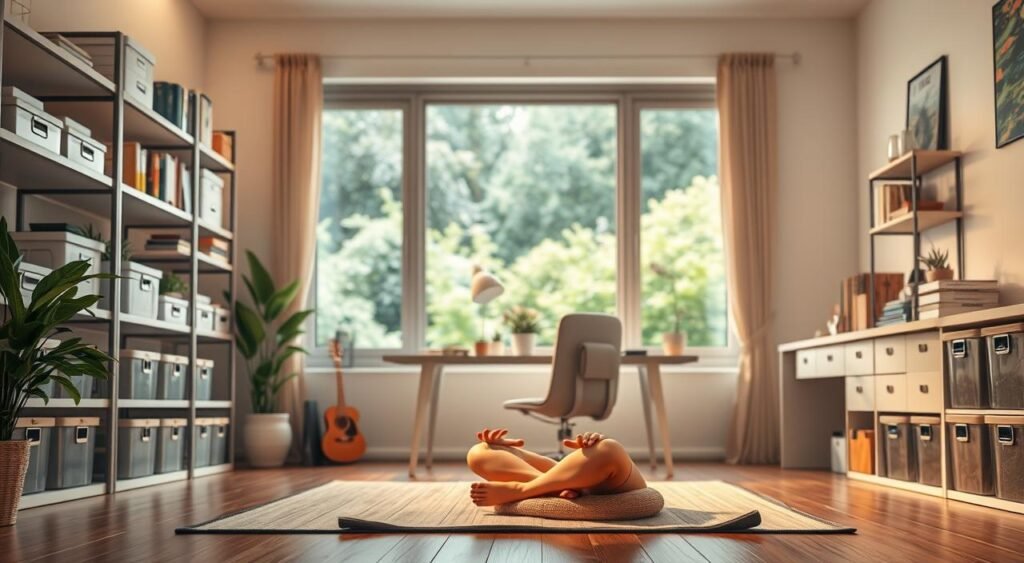
Emotional Well-Being Through Organization
Effective organization significantly boosts emotional well-being. By clearing out clutter and organizing spaces, you might notice a significant mood improvement. A clean environment fosters a calming atmosphere, reducing anxiety and promoting focus. This leads to greater mental clarity.
Decluttering not only frees up physical space but also restores a part of your sense of self. This transformation turns your home into a sanctuary that nurtures mental health and supports self-care.
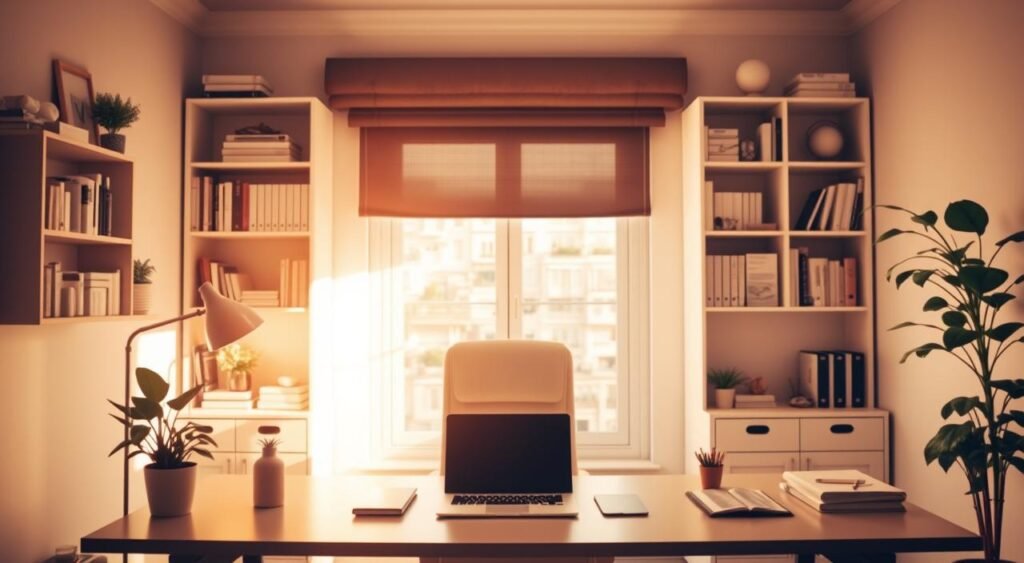
Understanding the emotional health benefits of a well-organized space is vital. It empowers you to control your surroundings, showing that organizing and well-being are intertwined. A tidy area boosts productivity, allowing for better concentration and reduced overwhelm.
Incorporating effective storage solutions is key to maintaining organization. By ensuring everything has its place, distractions decrease, creating a more serene environment. Learning to organize profoundly impacts not just your surroundings but also your daily feelings.
Discover more about organizing’s impact on emotional health with practical tips in this resource. Embracing this journey can lead to significant changes in your life perspective and overall well-being.
Tips for Sustaining an Organized Environment
Maintaining an organized space is a continuous journey that demands consistent effort. To sustain decluttering, regularly assessing your belongings is key. This simple habit prevents clutter from reappearing. Designating specific spots for items is another effective tip. It ensures everything has a place, making it easier to keep things organized.
Regular clean-ups are vital for maintaining organization. I dedicate a few minutes each week to tidy up clutter-prone areas. It’s also important to evaluate the purpose of your belongings. If they no longer serve a purpose, it’s time to let them go.
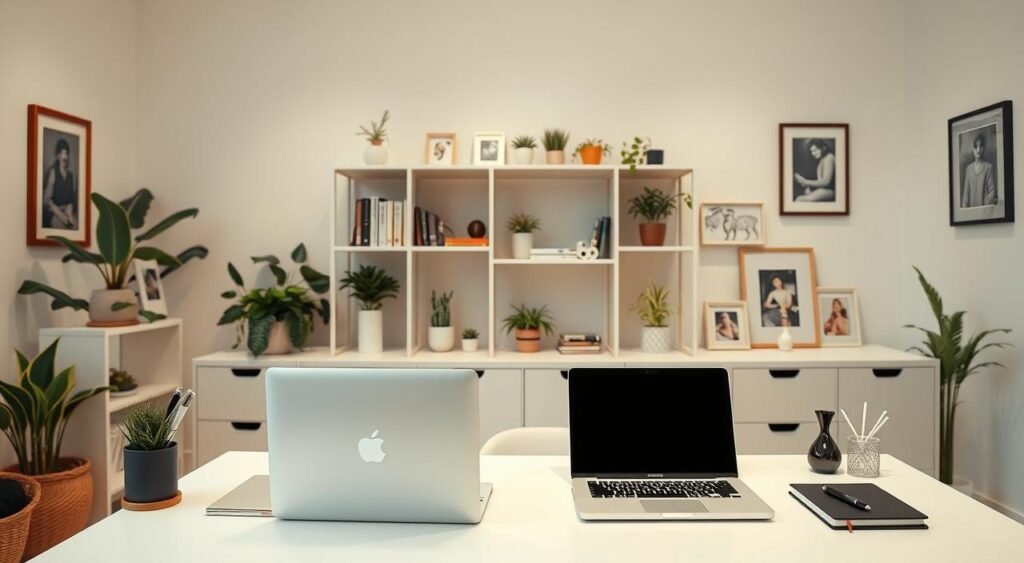
Creating systems that align with your lifestyle is essential. Whether you prefer weekly check-ins or seasonal decluttering, these strategies help keep your space organized. An organized environment not only improves your physical space but also clears your mind, boosting your overall well-being.
Incorporating Organization into Your Self-Care Routine
Integrating organization into your self-care routine requires deliberate choices and ongoing effort. Creating a consistent schedule is key to making organizing a part of your daily life. Allocate a few minutes each night to tidy up or set aside specific times for decluttering.
Link organizing tasks to your existing routines to make them more enjoyable. For instance, cleaning up after dinner can become a fun family activity. Or, take a few minutes each morning to organize your workspace. Turning these tasks into enjoyable experiences can make them less burdensome. Play your favorite music or reward yourself for reaching milestones.
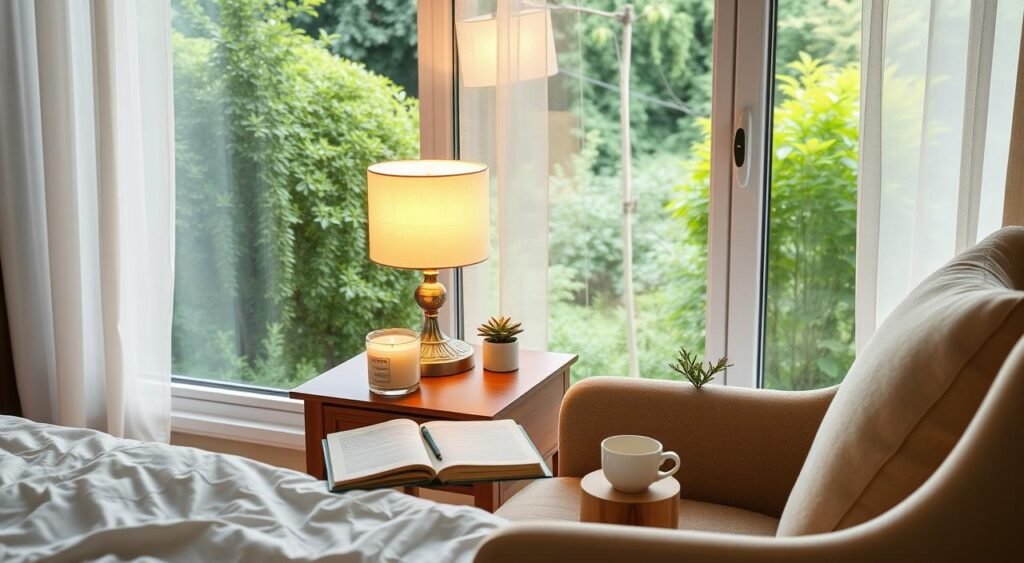
This dedication to organization not only improves your surroundings but also boosts your overall well-being. Over time, these organized spaces become effortless parts of your life. They support your journey towards a more balanced self-care routine.
Using the Right Tools for Decluttering
Choosing the right decluttering tools can transform your organizing journey. Begin by collecting essential organizing supplies like bins, boxes, and labels. These tools simplify the process and guide you toward effective organization. Utilizing color-coded systems can also improve clarity and accessibility in your spaces.
Digital tools add another dimension to your decluttering efforts. Apps for inventory tracking or reminders can keep you organized. Seasoned organizers suggest choosing a variety of tools for different items. This approach adds a personal touch that reflects your unique style.
Remember, the tools you choose should align with your organizing philosophy. By picking tools that match your preferences, you make the process more enjoyable and effective. Select versatile tools that can adapt as your needs evolve.
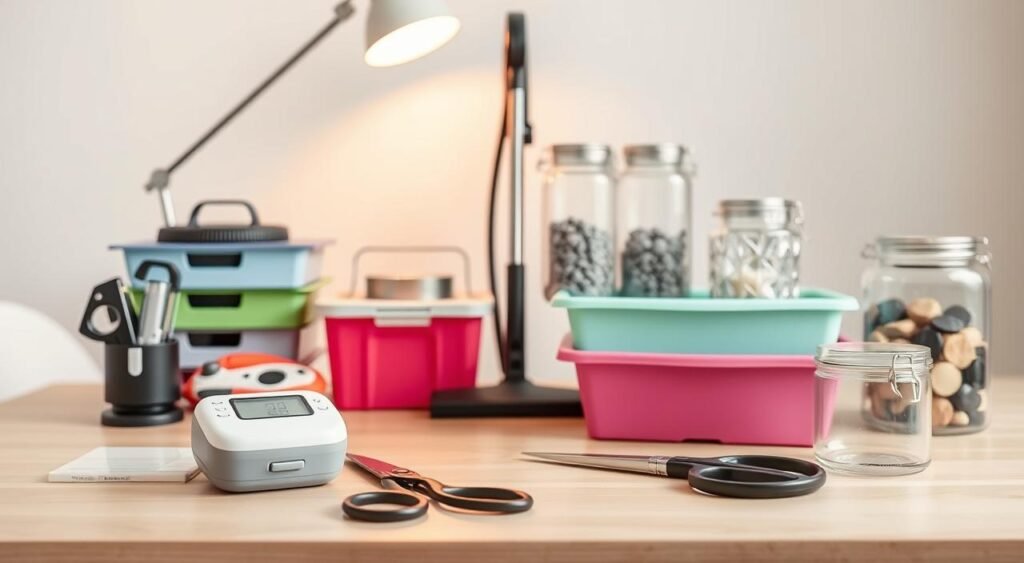
Finding Support in Your Decluttering Efforts
Embarking on a decluttering journey can be daunting. Support is key in overcoming these challenges. Friends and family can offer invaluable encouragement and accountability. They help keep you on track, ensuring you stay committed to your goals.
Professional organizers bring a unique set of skills to the table. They craft strategies that fit your specific needs, aiming for a clutter-free environment. Their expertise can significantly ease the process, making it less overwhelming.
Online communities provide a space to connect with others facing similar challenges. Sharing experiences and advice can be incredibly motivating. It fosters a sense of community, helping you stay inspired and motivated.
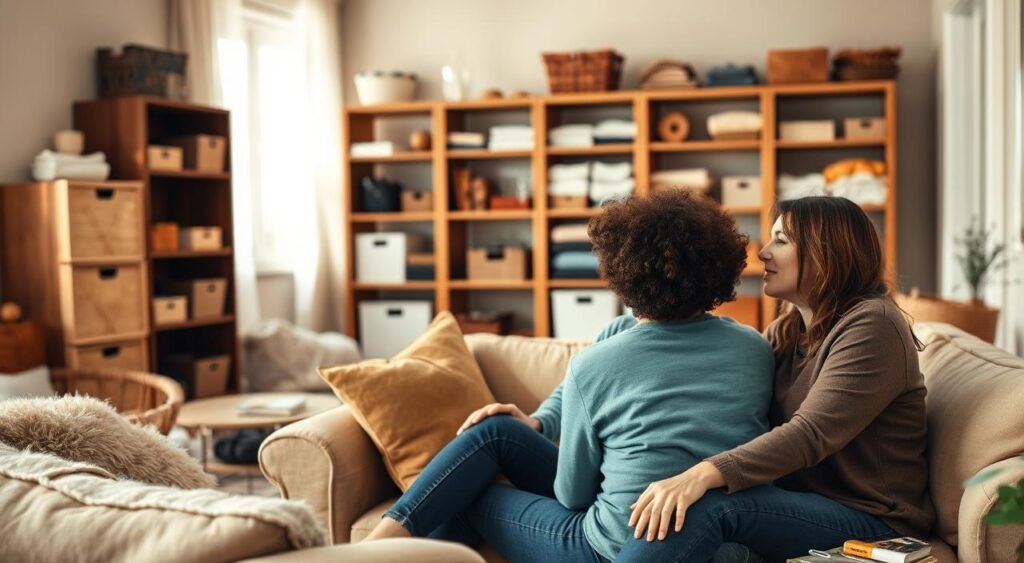
Working together, whether in person or online, can boost creativity and maintain momentum. Don’t hesitate to seek out support. Remember, you’re part of a larger community working towards the same goal.
Conclusion
Organizing as self-care is a transformative practice that improves many aspects of your life. By decluttering, you form deeper connections with your surroundings and yourself. This journey strengthens your emotional health and well-being, creating a sanctuary that reflects your true self.
The benefits of decluttering go beyond a tidy home; they give you control over your environment, reducing stress and anxiety. Remember, the goal is not perfection but progress that aligns with your values and aspirations. This can lead to a more engaged and peaceful life.
View organizing as self-care as a powerful act of love toward yourself. It guides you toward a calmer existence where each space reflects your intent and nurtures your emotional health. You have the power to create an environment that inspires and uplifts. So, take that first step today!
FAQ
How can organizing serve as a form of self-care?
Organizing creates a tidy environment that fosters emotional well-being and mental clarity. It helps reduce stress and anxiety.
What are the mental health benefits of decluttering?
Decluttering can enhance emotional well-being and improve mood. It decreases stress levels by creating a calm and organized environment.
What are some practical tips for starting a decluttering process?
Begin by focusing on one area at a time. Commit to short daily sessions. Set clear intentions to guide your organizing efforts.
How can I maintain an organized space after decluttering?
Regularly assess your belongings. Establish designated spots for items. Integrate routine clean-ups into your daily schedule to prevent clutter from accumulating again.
What role do values play in my organizing journey?
Understanding your core values helps you make intentional decisions about what to keep or let go. It ensures your space aligns with your priorities and emotional well-being.
Can mindfulness techniques be applied during decluttering?
Yes! Mindfulness techniques, like focused breathing, can alleviate stress during decision-making. They encourage self-compassion while letting go of items.
How can I engage with others while decluttering?
Consider seeking support from friends or family members. Hire a professional organizer. Join online communities for motivation and accountability.
What tools are essential for effective decluttering?
Useful tools include bins, boxes, labels, and even digital apps. They help you track your decluttered items and maintain organization over time.
